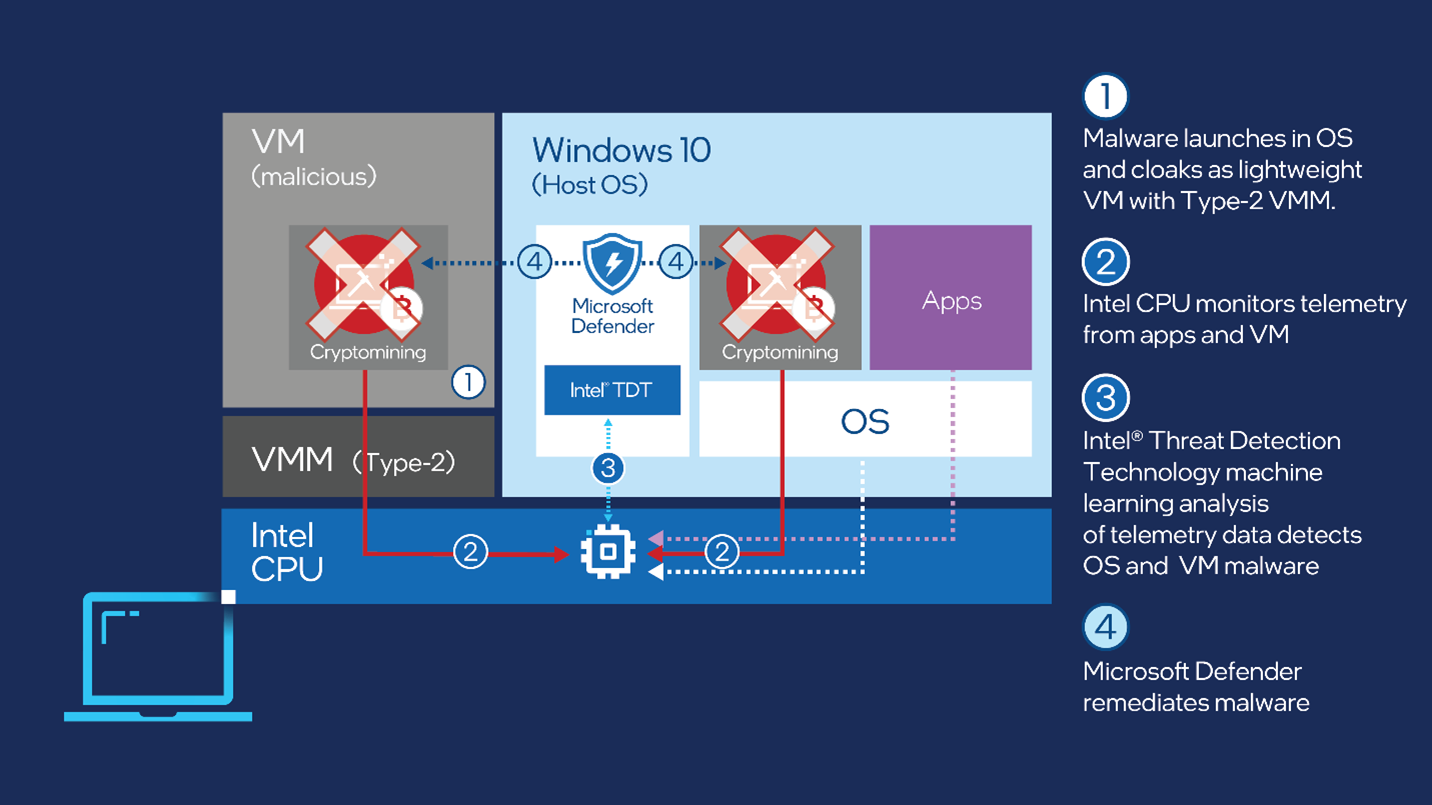Intel, Microsoft Team Up to Combat Cryptojacking
Intel and Microsoft are collaborating on a new project to help enterprise and small business customers avoid security issues that may involve others using PCs on your network to mine cryptocurrencies, known as cryptojacking.
The protection will be built into Microsoft Defender for Endpoint on systems using 6th Gen or later Intel vPro and Intel Core processors. Specifically, it uses Intel Threat Detection Technology, or TDT to take advantage of the CPU for machine learning to detect cryptomining.

In a press release, Intel stated that the rise of cryptocurrencies in the mainstream and their increase in value means that "cybercriminals [will] shift their focus from ransomware to cryptojacking." Intel claims that there was a 53% increase in mining malware attacks in the fourth quarter of 2020 compared to the quarter before it.
Cryptojacking, just like normal cryptomining, weighs heavily on a computer's resources and sends the crypto back to a wallet. This could drastically slow a computer. Intel suggests some cryptojackers can also spread over a network, where large businesses could have hundreds or thousands of devices.
Intel's TDT technology will use its machine learning and telemetry to "fingerprint" the suspicious activities, some of which it can offload to the integrated GPU. The cryptojacking threats will appear in Windows Defender to people using their devices, just like any other threat.
In a separate release, Microsoft's Karthik Selvaraj, principal research manager on the Microsoft 365 Defender research team wrote that "[e]ven though we have enabled this technology specifically for cryptocurrency mining, it expands the horizons for detecting more aggressive threats like side-channel attacks and ransomware."
At the moment, this appears to only be available on 6th Gen or later Intel vPro (and some Core) platforms running Microsoft's enterprise security suite. It's unclear if there are plans to further expand the program to general users or other silicon.
Get Tom's Hardware's best news and in-depth reviews, straight to your inbox.

Andrew E. Freedman is a senior editor at Tom's Hardware focusing on laptops, desktops and gaming. He also keeps up with the latest news. A lover of all things gaming and tech, his previous work has shown up in Tom's Guide, Laptop Mag, Kotaku, PCMag and Complex, among others. Follow him on Threads @FreedmanAE and BlueSky @andrewfreedman.net. You can send him tips on Signal: andrewfreedman.01
-
ginthegit ReplyWhy_Me said:Crypto mining is the devil.
This is so AMDIST.... Why should only Intel get this benefit. I know it is using a security feature, but to my ears it is saying that Intel is more protected than AMD and that Windows security is useless to this threat when using an AMD based system.
Bad Microsoft, Bad Intel. -
Findecanor Reply
My impression is that it was Intel who had initiated the work and then asked Microsoft to go along with implement it in Windows Defender.ginthegit said:Bad Microsoft, Bad Intel.
If AMD would develop something similar and present it to Microsoft, I am certain that Microsoft would want to incorporate that into Defender as well. -
rtoaht ReplyFindecanor said:My impression is that it was Intel who had initiated the work and then asked Microsoft to go along with implement it in Windows Defender.
If AMD would develop something similar and present it to Microsoft, I am certain that Microsoft would want to incorporate that into Defender as well.
Why so salty? It sounds like a great feature to have. -
rtoaht Replyginthegit said:Why should only Intel get this benefit.
Umm. I believe the millions of customers who would buy their product will also get the benefit. If you are not planning to be an Intel customer but want the feature ask your favorite CPU vendor to implement it in their hardware. -
ginthegit ReplyFindecanor said:My impression is that it was Intel who had initiated the work and then asked Microsoft to go along with implement it in Windows Defender.
If AMD would develop something similar and present it to Microsoft, I am certain that Microsoft would want to incorporate that into Defender as well.
AMD has got something similar, but as with SSEA 3DNow! and other AMD tech, Microsoft just beds up with its best mal practice partnertwo of the most litigated companies in the world , in a marriage of corruption. -
ginthegit Reply
Benefit? Like what? I am going to ask you a serious question. Do you think that windows needs to be as Big as it is to perform the function it performs. And what is this extra software doing?rtoaht said:Umm. I believe the millions of customers who would buy their product will also get the benefit. If you are not planning to be an Intel customer but want the feature ask your favorite CPU vendor to implement it in their hardware.
Compare it to Linus, that has smoother operation, better drivers when done Open source, smaller file size, and less crashes.... All with the same functionality and 1/5 of the size.
When two companies like this get together they often conspire.
Safety was not a concern for intel when it first found out about Specter etc, they sat on it for ages. Intel also gave FBI a back door code to its processor using level 0 code, and Microsoft, lets just say they have deliberately buggy code. there is no way with all the coders and proof reading coders, that it could be any other way, but Bugs keep coming out that are easy for Crackers to exploit, and its always the same type of vulnerabilities, the type that Intel and Microsoft were supposed to have fixed (but obviously haven't).
To be honest, if there isnt a patch or update that the antivirus companies can't come out that can shut down suspicious heavy resource using tasks, then they are useless and not worth their money. This is more gimmicks and nonsense.
